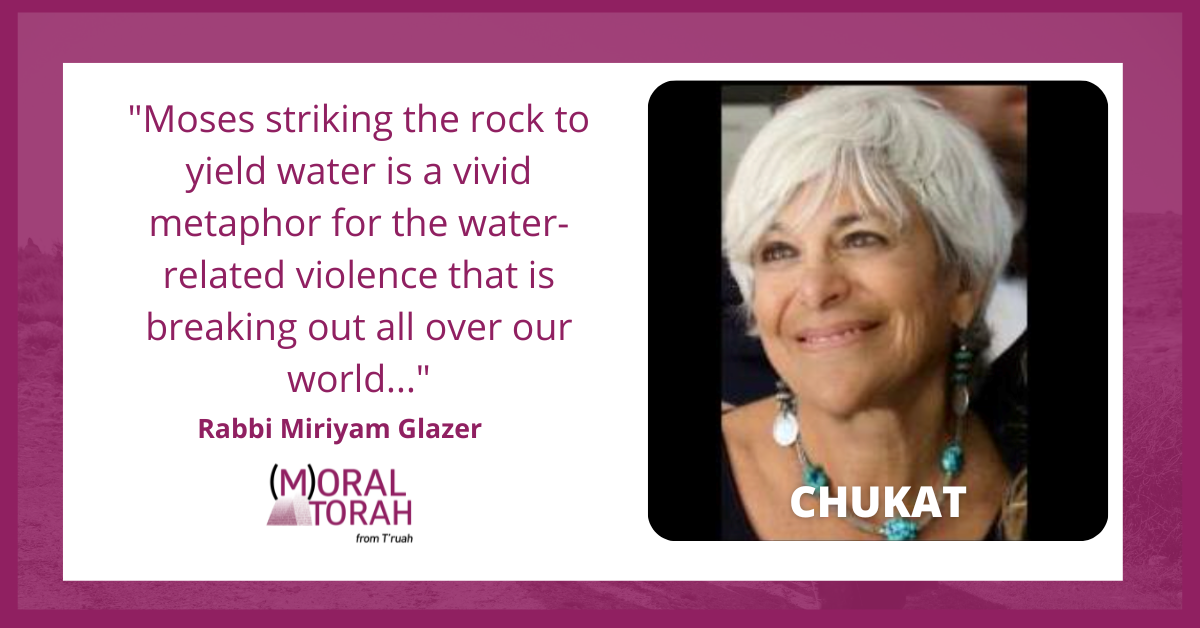A D’var Torah by Rabbi Miriyam Glazer for Parshat Chukat
Isaiah prophesies:
For waters will burst forth in the desert
Streams in the wilderness.
…earth shall become a pool,
Parched land, fountains of water;
The home of jackals, a pasture…
And a highway shall appear there
…called the Sacred Way.
(Isaiah 35:5 and following)
Water flows through our ancient tradition both for death and for life. While the story of Noah relates how the primeval flood drowns most of the world, Genesis also describes Abraham and Isaac digging wells and how Rebecca’s kindness and generosity at a well shaped the rest of her life and the whole Jewish story. Later in Torah, the same Nile in which Pharaoh sought to drown all Hebrew babies becomes the one in which baby Moses is floating when, guarded by Miriam, he is rescued by the daughter of Pharaoh. Midrash, our story-telling tradition, teaches us that wherever the Israelites camped after the Liberation, a well sprung up to provide them with water, in honor of Miriam’s holy act.
Sign up to receive (M)oral Torah in your inbox each week.
For death and for life… In our portion, Chukat, the terse description of the death of Miriam is immediately followed by a depiction of the desperate thirst and rage of the people, for no sooner does Miriam die than the water disappears.
To be trapped in a world without water… To be driven by an unquenchable thirst… That terror is at the core of our ancient story. In a fearsome way that story is prescient: The year 2021 was one of the two most parched in 300 years. Those of us in the western U.S. are face-to-face with the worst megadrought in 1,200 years. More than one billion people on our planet are enduring water scarcity; in another three years, half of our planet’s population will have to endure water-stressed lives. Up to 700 million people today are at the risk of displacement because of water scarcity. What does that suggest for the future of life on Planet Earth?
Our Torah depicts what can happen to us in a world without water. Faced with the people’s desperate thirst, Moses and Aaron fall on their faces to pray for a revelation. God responds by telling Moses to assemble the people before a rock and to command the rock to yield its water. Overcome by the quarrelsomeness of the thirsting people, however, Moses — out of frustration? Out of rage? Out of grief over the sudden death of his sister Miriam? — strikes the rock — twice! — instead of speaking to it. The response of God is harsh and swift: “But for this sin alone,” says the medieval biblical commentator Rashi, Moses “would have entered” the Promised Land. Instead, he dies in the desert.
Find more commentaries on Parshat Chukat.
Moses striking the rock to yield water is a vivid metaphor for the water-related violence that is breaking out all over our world — particularly in the Middle East, as well as in South Asia and Africa. But that violence, along with the devastating impact of global warming, as well as the massive migrations driven by desertification, need not be inevitable.
Years before the episode in this parshah, when the newly freed Hebrew slaves had cried out with thirst, God told Moses to strike a rock in the desert to bring forth water (Exodus 17:6).  But decades passed. The miraculous parting of the Red Sea was long past. “Mannah” from heaven was an old story, just as the wonders of the Industrial Age are passé for us. Speak to the rock, God instructed Moses.
But decades passed. The miraculous parting of the Red Sea was long past. “Mannah” from heaven was an old story, just as the wonders of the Industrial Age are passé for us. Speak to the rock, God instructed Moses.
Today, more than ever before, we must speak to — we must direct our attention to — the causes of water scarcity in our age. It is not yet too late for future generations to be born on a planet that flows again with “milk and honey.” If we act now, it is not too late.
Rabbi Miriyam Glazer is Emerita Professor of Literature at American Jewish University. Her books include Dreaming the Actual: Contemporary Fiction and Poetry by Israeli Women Writers and Psalms of the Jewish Liturgy: A Guide to their Beauty, Power and Meaning.

